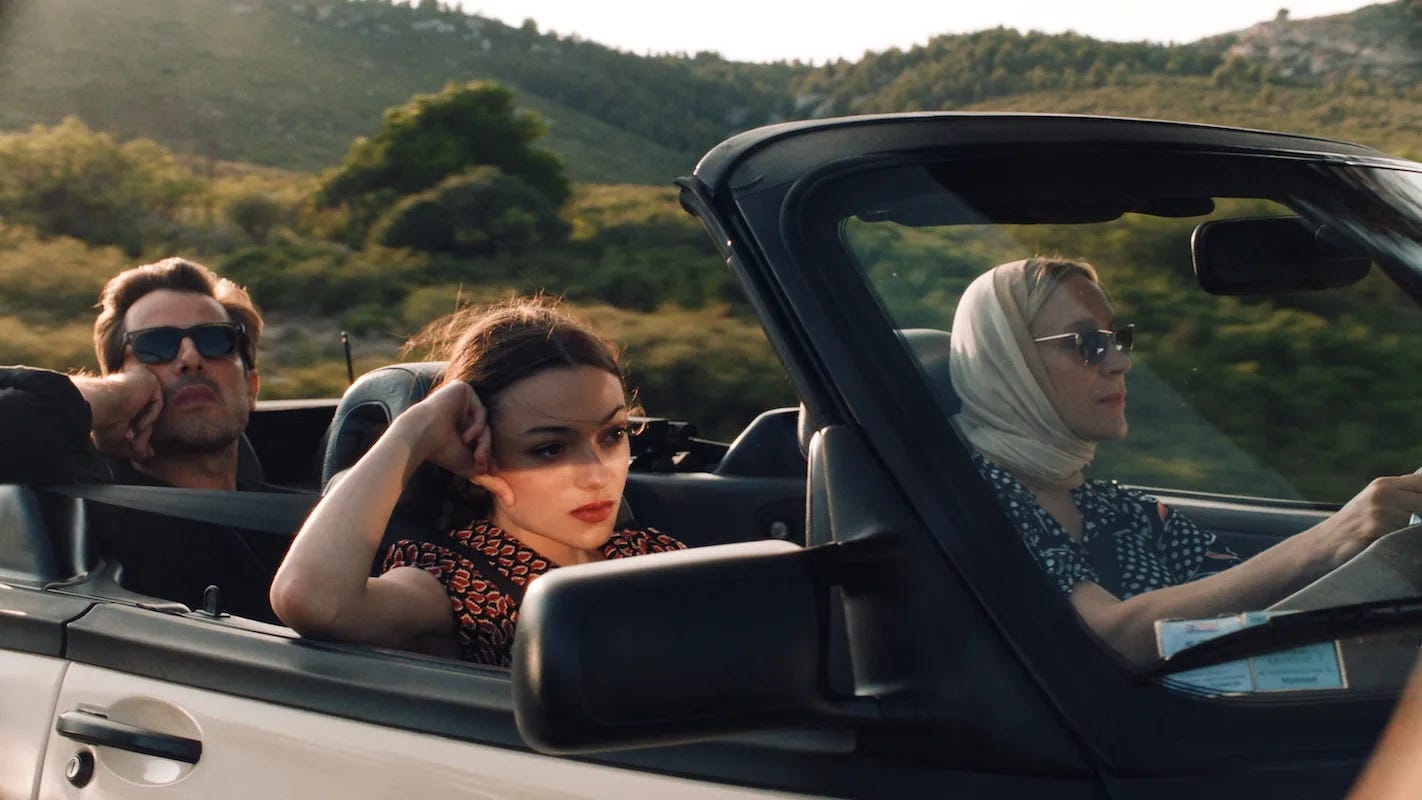Bonjour Tristesse
A lovely, lyrical film about a young girl spending a languid summer in the south of France, until an old family friend shows up and comes between her and her father.
If you’re well past your teen years, as I am, it can be hard to remember that time from an emotional vantage. There’s a sense of feeling unmoored, consciously distancing yourself from parents but understanding you’re not yet ready for full independence.
This larval stage of adulthood can often lead to unwise behavior, not just in terms of acting out in silly ways but hurting those you love most. “Bonjour Tristesse” is about a girl who’s basically a good person but winds up doing very spiteful things out of a sense of shrugging off the comforting arm of the adults draped across her shoulder.
Based on the book by Françoise Sagan, it was previously adapted into a 1958 film starring David Niven and a 1995 TV movie. This version was written and directed by Durga Chew-Bose in her debut feature behind the camera. It’s a lovely, lyrical movie, a sun-dappled lounge in the south of France, though I sometimes found its pacing as languid as its setting.
It takes place during the summer, in that European sense of the word that translates to American as “not working for months at a time.” I’ll admit we Yanks could stand to give our workers more PTO and protections, and in general not embrace this culture where we complain about how busy we are because everyone wants to seem busy.
But ye gosh, those folks across the pond — the French, Italian and Greek in particular — could use a little more ambition.
Cécile, the main character, is played by Lily McInerny. Interestingly, she’s an American actress and I’m guessing Cécile is too in that she does not project any kind of a French accent, though her general demeanor is very continental. Cécile lies about in the sun, reads books, smokes cigarettes and occasionally canoodles with Cyril (Aliocha Schneider), a neighbor’s son about her own age.
Her father, Raymond (Danish actor Claes Bang), has a similar level of activity. We never learn his vocation, but it’s obviously remunerative enough to fund a large, handsome villa on the beach. They lost their wife/mother a long time ago, and the two have settled into a relationship that is close and loving but nearer to friends than parent/child.
Raymond gives Cécile a lot of rope — even addressing him as Raymond — and she’s used to having her own way.
Joining them for the summer is Elsa Mackenbourg (Naïlia Harzoune), Raymond’s girlfriend and a famous dancer. As with his daughter, Raymond’s connection is warm but loose. They do not place any demands or expectations on each other.
Raymond is excited when an old friend, Anne Larson (Chloë Sevigny), is convinced to join them. Also famous, as a clothing designer, she was friends with Raymond and his wife long ago and, it’s implied, at one time a competitor for his affections. Raymond talks about how nice it’ll be to have a fourth person, but something in his gaze says there’s more there.
At first, Cécile is intrigued by Anne, who’s reserved and mysterious. Anne gives her a gorgeous white dress of her own creation. She’s a little put off by Anne’s subtly controlling ways, like suggesting Cécile needs to spend more time studying for her fall classes since she didn’t do very well on her spring exams.
Things take a turn when Anne and Raymond announce quite abruptly they’ve decided to get married. Elsa is dismissed without even so much as a true confrontation. She takes it in stride, but Cécile seems determined to exact some sort of reckoning.
This involves hatching a plan, which I’ll not reveal the details of, that leads to increasing strife with Anne, alienation from Raymond and eventually more dire outcomes.
The title translates as “Hello, Sadness,” and a sense of tragedy pervades the entire piece.
“Bonjour Tristesse” is a movie of moods and slow, tidal shifts in emotions. There’s no big confrontations or people flinging their feelings around in shouted dialogue. It’s a story about how a summer turns from sweet to bitter.
McInerny, willowy with big, expressive eyes, makes for a compelling central figure, despite the fact she doesn’t “do” very much from a traditional storytelling standpoint. She gives Cécile a sort of a pensive, probing quality — a young woman who mostly lives inside her own head and isn’t always the best at showing her feelings to others.
I wish the character of Anne was developed more. As it is, Sevigny just sort of shows up with her Mona Lisa smile, self-contained and maintaining her own aura, and then Anne sets upon Raymond like a long-awaited meal. She seems to see Cécile as a problem to be overcome. But their relationship moves so quickly into conflict, I never felt like we get a real bite on Anne as a person, who she was before she entered the film.
This movie is being described as a coming-of-age romance, but I’m not quite sure if that’s accurate. Perhaps it’s partly right — it’s the tale of a girl learning to love, not just the kissy kind but how to regard others as they really are rather how we see them through the prism of our own self.
Honestly, though, I think a nice summer job would’ve done her a lot more good.






Bonjour Tristesse was not "previously adapted into a TV movie in 1995 starring David Niven" -- it was a 1958 big-screen film directed by Otto Preminger and starring David Niven and Jean Seberg.